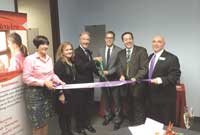Sweeping Changes Proposed MassHealth Revisions Will Affect Real Estate And Insurance Planning For
Governor Mitt Romney has proposed a series of sweeping changes in the methods used by Massachusetts to recover costs of nursing home care payments. Elder advocacy groups and insurance providers are startled and anxious as a result of the proposals, which will have an impact on hundreds of Western Mass. families who have based real estate ownership transfers on their current understanding of estate recovery rules.
Among the changes is a proposal that gives the state access to property interests that pass upon death to a spouse or other survivor through joint tenancy, tenancy by the entirety, life estate, living trust, right of survivorship, beneficiary designation, or other arrangement.
These changes would affect married couples and anyone else involved in joint ownership and life estate remainder arrangements with nursing home patients who need MassHealth benefits to pay for nursing home care.
The proposed changes to Chapter 118E (public welfare law) allow the state to reach assets that have not been subjected to estate recovery, because the assets were not included in a decedent’s probate estate. The current state practice allowed people to arrange pre-death property ownership arrangements that would avoid the probate court system.
By avoiding probate, a decedent’s nursing home care costs are dissolved upon the death, even though the decedent may have held a life estate or joint ownership interest in property. That would dramatically change if the state opens up estate recovery to any property “in which the decedent immediately prior to death had any legal title or interest.”
The proposed law redefines the meaning of a person’s ‘estate’ to include not only property passing through probate court, but also any other property and assets “in which the individual immediately prior to death had any legal title or interest.” This change would affect many elders who made decisions and choices based on current estate recovery laws, with the idea they would pass property on to their survivors.
To enforce the new practices, the proposal would allow the state to begin charging interest on its claims for nursing home cost reimbursement either 60 days after a written statement is mailed to the person to whom the decedent’s legal title or interest passed, or (for real property) after a notice is filed with the registry of deeds, whichever date is later.
For annuities and life insurance policies held on the life of a decedent age 55 or older, the company or institution holding the asset would be required to notify the state before making payment to a survivor, designated beneficiary, or other person.
Annuities would be treated like trusts, and the Commonwealth would become a beneficiary of the annuity “to the extent of MassHealth benefits provided.” The proposal would amend Chapter 175 (insurance law) and require every company authorized to issue policies of insurance to provide information to the Division of Medical Assistance either by hard copy or by electronically reporting to the state any claimant’s Social Security number and other information from the company’s files, including the claimant’s name, address, and date of birth.
The state would no longer pay a nursing facility for reserving a bed if a resident had to be transported for treatment in a hospital.
The proposed law also mentions wild-card possibilities that could be imposed in the future. Included is a potential five-year retrospective for asset transfers, as compared with the current look-back period of three years for people seeking eligibility for nursing home payments after they transfer property for less than market value.
Another potential wild-card change would be a tougher approach to the way the state calculates how much money and property a married couple can keep when one spouse goes into a nursing home. Under the current rules that went into effect on Jan. 1, the state takes 50{06cf2b9696b159f874511d23dbc893eb1ac83014175ed30550cfff22781411e5} of any countable assets from the spouse who continues to live in the community, beginning with any countable assets over $18,132. If a couple has savings and assets of more than $181,320, the state will be taking everything that the couple has over and above that $181,320 figure.
Attorney John L. Roberts is a member of the National Academy of Elder Law Attorneys and the Massachusetts Real Estate Conveyancers Association, and serves area residents from an office at 1238 Parker Street in Springfield; (413) 782-4800.


Comments are closed.